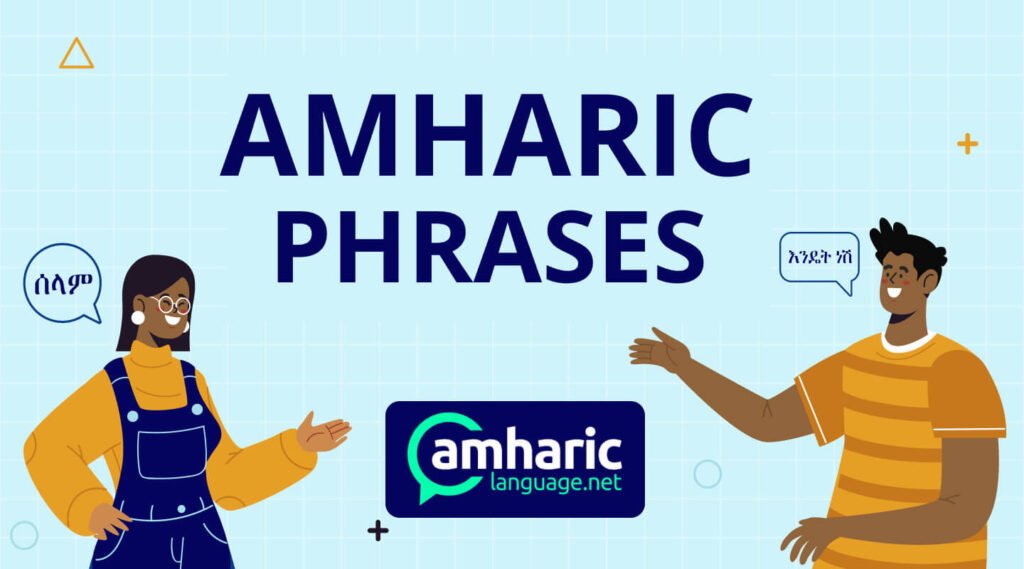Amharic Phrases
Whether you’re traveling to Ethiopia, connecting with Amharic-speaking friends, or simply exploring this beautiful language, learning some essential Amharic phrases is a great way to start.

Amharic, the official language of Ethiopia, is spoken by millions and has a rich history and unique writing system. Below, we’ve organized key phrases and expressions to help you communicate in various situations, from introductions to emergencies. Use these phrases to enhance your experience and build connections!
Basic Amharic Phrases
- Hello: Selam
- Hi: Haye
- How are you?: Dehina neh? (male) / Dehina nesh? (female)
- I’m fine: Dehina negni
- Nice to meet you: Anetene bemagenate dese belognale (male) Anchim bemagenate dese belognale (female)
- Thank you: Ameseginalew
- Sorry: Aznalehu
- Goodbye: Dehina hun (male) / Dehina higni (female)
- Yes: Awo
- No: Aydelem
- Please: Ebakih (male) / Ebakish (female)
- You’re welcome: Minim aydel
Introducing Yourself and Getting to Know Other
- What is your name?: Simeh manew? (male) / Simish manew? (female)
- My name is .. : Sime … new
- Where are you from?: Keyet hager neh? (male) / Keyet hager nesh? (female)
- I’m from the U.S.: Ke Amerika new yemetahut
- Do you speak English?: Englizigna tichilaleh? (male) / Englizigna tichiyalesh? (female)
- I don’t understand: Alegebagnim
- What do you do for a living?: Serah mene new?
- I’m a student: Tamari negne
Common Questions and Useful Expressions
- What?: Min?
- Where?: Yet?
- When?: Meche?
- How?: Endet?
- Why?: Lemin?
- How old are you?: Senetih manew?
- I’m 33 years old: Selasa sost amet new
- Can you help me?: Erdata tichilaleh?
- I don’t know: Alawkum
- A little bit: Bemateno
Directions and Getting Around
- Where is ?: yet new?
- Go straight: Ketita hid
- Turn left: Wede gera hid
- Turn right: Wede kegni hid
- Stop: Kum
- Nearby: Kirb
- Where is the airport?: Awroplan marefiya yet new?
Time and Days
- Now: Ahun
- Today: Zare
- Tomorrow: Nege
- Morning: Tewat
- Afternoon: Ke seat
- Night: Mata
- Rain: Zinab
- Sun: Stehay
- Dry season: Bega
- Rainy season: Kiremt
Shopping and Dining
- How much is this?: Sint new?
- It’s very expensive: Wid new
- I want this one: Yihen efeligalehu
- Do you have rooms available?: Meneta kefeloch yenorachahal?
- Vegetarian: Atkilt bicha temegabi
- Water: Wiha
- Cold: Kezkaza
- Hot: Muk
- No sugar: Sikuar yelelew
Holiday Wishes and Celebrations
- Happy birthday: Melekam ledete
- Happy new year: Melekam adis amet
- Merry Christmas: Melekam yegena bal
- Good luck: Melekam edele
- Congratulations: Enkwan dese alehu
Emergency Phrases
- Help: Erdata
- I need a doctor: Hakim efeligalehu
- Call an ambulance: Ampulance dewil
- Call the police: Polis dewil
- I’m lost: Tefabigni
- Where is the hospital?: Hospitalu yet new?
Numbers in Amharic
- 1: And
- 2: Hulet
- 3: Sost
- 4: Arat
- 5: Amist
- 10: Asir
- 20: Haya
- 100: Meto
- 1,000: And shi
Basic Pronouns and People
- I: Ene
- You: Ante
- He: Esu
- She: Esua
- They: Enesu
- Male: Wend
- Female: Set
- Father: Abat
- Mother: Enat
The Amharic language is phonetic, meaning that pronunciation closely follows the written text. Practice speaking slowly to get familiar with the sounds and stress patterns. With these phrases, you’ll have a solid foundation for basic Amharic interactions and a way to connect with locals and navigate Ethiopia more confidently. Enjoy your learning journey!
